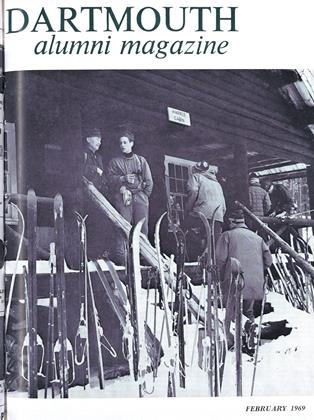By Roger H. Hull '64 and John C. Novogrod. Dobbs Ferry:Oceana Publications, 1968. 211 pp. $7.50.
Certainty about the role of the United States in the Vietnam conflict is an advantage held by pacifists and crypto-imperialists. The former condemn American intervention on the basis of a higher order of moral postulate condemning all violence; the latter support American military involvement as a logical corollary to the belief that the United States must police a generously defined "Free World." Both are able, therefore, to select the historical and military "facts," plentiful in support of both positions, that conform to initial premises. Other concerned citizens, probably a majority of Americans, including this reviewer, are more likely to be confused by conflicting "facts" assiduously collected, sorted, and disseminated by reporters, politicians, scholars, and intellectuals who have together occupied every conceivable position on the hawk-dove spectrum dispersed over the "American Algeria."
One plausible approach to contradictory data and opposed opinions, even when passionately held, is to order the facts according to a body of rules accepted as principles of law. Such a body of rules, an international law, applicable to the Vietnam conflict, does exist. Although international law may have "gaps" as some theorists claim, these real or imagined "gaps" do not impede the adoption of a legal perspective in evaluating American participation. Indeed, the legal case cannot be ignored. In March 1966, the State Department spurred the lawyers' dialogue by publishing The Legalityof United States Participation in Defense ofVietnam, an adversary document which immediately gave rise to a flurry of statements by international lawyers publicized within the Congress. In 1967, the Lawyers' Committee on American Policy Toward Vietnam presented the prosecution's brief, Vietnamand International Law, an argument incorporating more of the crusader's zeal than the detachment expected from so eminent a group of scholars. Roger Hull and John Novogrod present the case for the defense in the volume under review.
Law and Vietnam is a carefully researched, lucidly written brief designed "to develop fairly and objectively both sides of the factual and legal questions and to allow the reader to formulate his own views." Thus, it is ostensibly an unintended consequence that the authors' conclusions support American involvement in Vietnam. Internally consistent, the argument is often more convincing than the "special pleading" of the Lawyers' Committee if judgment is confined to style of presentation. But Law andVietnam must also be classified as "special pleading." If it were a courtroom case, then the Administration's defense would be much strengthened by the authors' useful clarification of the notion of necessity in the exercise of self-defense, a clarification accomplished by updating Daniel Webster's dicta on self-defense in the Caroline case. The further discussion of the "inherent right of individual or collective self-defense" authorized in Article 51 of the United Nations Charter provides a reasonable contribution to the current unsatisfactory guidelines for identifying indirect aggression. Additional credit would have to be extended for the consistency of the argument that attributes statehood to both the "State of Vietnam" and the "Democratic Republic of Vietnam." If this phase of the case for the defense is accepted, the conflict in Vietnam can no longer be described as a civil war. Since I consider this issue decisive in assessing United States policy, I can only register my dismay that the characterization of the conflict by the Lawyers' Committee as a civil war has no conclusive advantage over the Hull-Novogrod position.
The temptation to conclude that the law relevant to the Vietnam war is "not well settled" ought to be resisted. Law in relations among states is neither more nor less settled than law among individuals within a domestic polity. The problem is not an unsettled law but a failure by statesmen to settle on who ought to interpret and enforce the law. In the absence of such agreement, I find it preferable to maintain the distinction, popular with some international lawyers, between justiciable and non-justiciable disputes.
Mr. Bliss is Assistant Professor of Government, Dartmouth College.
 View Full Issue
View Full Issue
More From This Issue
-
 Feature
FeatureTHE UNSUNG HERO OF THE DARTMOUTH COLLEGE CASE
February 1969 By Susan Liddicoat -
 Feature
FeatureThe Bearing of the Green
February 1969 By Mary B. Ross ('38) -
 Feature
FeatureA Call for Equal Opportunity
February 1969 -
 Feature
FeatureA Student View of the Crisis, 1816-19
February 1969 -
 Article
ArticleTrustees and Alumni Council Meet
February 1969 -
 Article
ArticleThe Undergraduate Chair
February 1969 By CHRIS KERN '69
HOWARD BLISS
Books
-
 Books
BooksYOUR HEARING, HOW TO PRESERVE AND AID IT.
April 1933 -
 Books
BooksTHE PSYCHOLOGY OF RADIO
January 1936 By C. N. Allen '24 -
 Books
BooksSINCE THE CIVIL WAR
May 1936 By Frank Maloy Anderson -
 Books
BooksERNEST HEMINGWAY: A LIFE STORY
MAY 1969 By JEFFREY HART '51 -
 Books
BooksMyth and Counter-Myth
NOVEMBER 1981 By Robert H. Ross '38 -
 Books
BooksMODERNIZATION, DISLOCATION, AND APRISMO: ORIGINS OF THE PERUVIAN APRISTA PARTY, 1870-1932.
October 1974 By SCOTT PALMER '59


